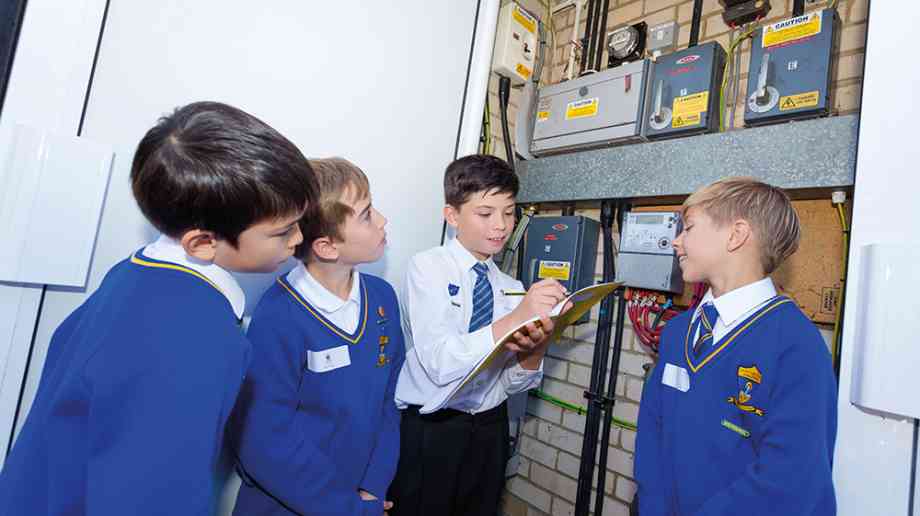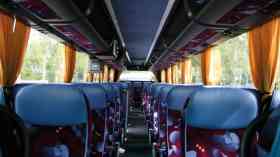
How energy efficient is your school?
With the average school energy bill in the UK coming to £31,000, Eco-Schools England looks at small changes that can make a big difference to the energy efficiency of your school.
The Eco-Schools programme revolves around nine environmental topics, with each one given its own month of profile throughout the year.
November was Energy Month at Eco-Schools. It’s an exciting one for us given how big an impact a review of a schools energy usage can create. We encouraged schools to look at the many small, easy ways that they can save energy – and in turn, save their school money.
Every topic of the Eco-Schools programme is intended to create fascination in students and be critical in the sustainability of a school’s everyday activities. Crucially, topics are something that a group of children, supported by the school’s leadership, can tackle to improve the school’s environmental credentials.
To this end, there is no greater cross-benefit topic than energy. Reviewing and monitoring energy usage has huge learning benefits too – children love the responsibility of helping the school to make significant savings. Energy plays a big part in all of our lives and so educating children in school, involving them in conversations around energy, and even letting them lead the way, all helps develop young people who realise that this resource shouldn’t be taken for granted.
Whether children are interested in the science behind energy, the research into how to improve efficiency or the statistics in evaluating the data – as a resource that schools buy in and use, it’s one of the best for educating students through experiential learning and especially around STEM subjects.
It is estimated that an Eco‑School is 30-40 per cent more energy efficient than a non‑Eco‑School, so what do they do differently?
Doing things differently
We’ve got Eco-Schools who have ‘gone solar’ and are now reaping the benefits of taking more control over their own energy with solar panels. We’ve got Eco-Schools who have installed high-performing LED lights, to reduce energy wastage and brighten their classrooms. And Eco-Schools who encourage yearly campaigns to involve the whole school in just how much can be done to save energy - and those all-important pennies.
With the average school energy bill in the UK coming to £31,000 – can you afford not to be on the front foot when it comes to energy?
Ten top tips for schools
We worked with our energy sponsor, EDF Energy, to come up with ten top tips for schools looking to reduce their bills and increase their credentials.
Firstly, consider switching desktops in school for laptops. Many schools have traditionally gone for desktops when upgrading IT, but if you are looking to change your computers any time soon – then the obvious option has to be laptops. Over a year they will consume 85 per cent less electricity.
Secondly, it pays to shop around for the best energy deal. Larger schools could be in line to save thousands through simply shopping around for the best offer out there. The market is wide and varied, but definitely worth looking at in detail.
The whole school should be involved in energy usage. For many years, energy was bought in by the budget holders and seen purely as a big, unavoidable expense. By getting everyone in the school involved, from the caretaker to the early years, collectively big savings can be made.
Schools should consider switching their lighting. School buildings take a lot of lights to make them bright, dynamic places to learn and work. Many lights were fitted when schools were built and no one has looked in to changing them since. Switching to LED can save 80 per cent on costs related to lighting and costs of installation are often covered by savings within a couple of years.
What’s more, everyone should be encourage to turn off the lights. This one is hotly debated with some saying it uses more energy to turn off and on than to leave on, but it’s a myth. You should turn off lights if leaving the room for more than five seconds. If they are left on overnight you could be talking about £15 extra per year – per light!
Heating
Make sure your schools heating is turned down or even off overnight. Heating is one of the biggest energy users. Having it timed to come on in the mornings saves it being on throughout the night and draining further energy.
Schools should also check that the building is insulated effectively. You could be losing heat through windows and doors, but also through the roof. Tightening up in these areas will mean the heaters can be on for less time and at a lower heat.
Temperature checking class rooms is another way to save energy. If you can turn the temperature of a room down by just 1 degree Celsius, you can save between 5-10 per cent on your heating bill.
Choose renewables to take control of your own energy – like solar, wind or biomass. Rarely will they provide all of the energy you need, but can contribute significantly and help you to cut costs in the long term. Consider switching to a low carbon provider for the energy you can’t generate yourself. That will also help you limit your impact on climate change.
Lastly, schools should share their success. Make the monitoring of energy in your school visible to everyone. Monthly graphs showing usage are easily created and help to involve everyone. Once you hit a milestone or have achieved a significant reduction – share it. Mention it in assemblies, on your website, on notice-boards. Tell people how much money you have saved too. This will inspire everyone to keep going with their energy efficient practices and leave them feeling satisfied with their own small efforts amounting to a bigger gain.
Switch Off Fortnight
Switch Off Fortnight took place from 14-27 November. Eco-Schools has worked with EDF Energy’s education programme, the Pod, since 2009, helping to promote their national energy campaign, Switch Off Fortnight. The campaign is a great way for schools to start on their journey to becoming more energy efficient.
The Pod’s Switch-Off Fortnight isn’t just a chance to learn about energy; it’s an opportunity to have lots of fun too. Students can take responsibility for running the school campaigns, going undercover to carry out an energy audit and telling off teachers and parents for leaving lights on. And as every teacher knows, students are more likely to remember key messages – like the importance of saving energy – when they’re delivered in a fun and engaging way, by their peers.
The campaign has built up momentum over the past seven years because it has a simple but effective message at its core about saving energy. Thousands of schools take part each year and there is also a whole range of free, curriculum-linked resources to support the campaign including assemblies, audits, posters, games, films and more. Plus, the Pod send out a limited number of resources packs in the post to schools who sign up to take part.
The campaign isn’t just about making energy savings at school; it’s about taking the Switch-Off message home to help even more people save energy. It’s a chance to involve parents, families and friends in what the school is doing and build closer relationships with them.
We love Switch Off Fortnight as it has been designed so that any completed activities could count towards one of our Eco-Schools awards. Simply taking part could help schools achieve a Bronze award (the first step towards Green Flag) and for those schools who have already achieved this level, the campaign work could contribute towards their application for a Silver award or even a Green Flag.
For more information, to access free teaching resources and to join in with the campaign, visit www.jointhepod.org/switchofffortnight.
Eco-School Case Study
Implementing energy saving in schools can be really easy to do and fun for everyone involved. Competitions are often a great way to engage young people and it was shown to be effective at an Eco-School in Somerset.
Bruton School for Girls has a central Eco-Committee, a group of students who have taken on the responsibility of helping their school become more sustainable, and driving it towards earning a Green Flag.
One of the requirements of gaining a Green Flag is to involve the whole school community and so, after choosing Energy as one of their key topics, the Eco Squad at Bruton Girls came up with the concept of a ‘Switch Off Scheme’.
“The idea came when talking to Mr Wells, our estates Bursar in our Eco-meetings. He had emailed the school on many occasions flagging up the amount of energy we were wasting by leaving lights on and not shutting windows,” said a member of Bruton’s Eco-Committee. “So we decided that it was something we could address, something with a genuine need, and something we could easily monitor the success of.”
“Our approach was a whole school competition whereby each hall (house in the school) was allocated zones of responsibility within the school and 200 points. The lights were monitored daily and if lights in their particular zone were left on then points were deducted from their score. The house with the most points at the end of a two week period was the winner of the competition and was awarded points to go towards the yearly hall competition. To get people excited about taking part, and to outline the rules, we created a short video and presented it in an assembly. Mr Wells featured too, explaining how big an issue it was for the school and how if everyone chipped in, it would make a big difference.”
The results for the school were impressive. As well as getting a big tick for involving a wide spectrum of pupils and adults – they saw a reduction in energy usage almost immediately.
But the campaign had an even bigger impact within the school. By everyone being made aware of the importance of energy efficiency, and learning simple ways to improve it, it changed the way students and teachers saw the issue and in turn their behaviour over the longer term.
Get involved
Eco-Schools would urge schools to take energy usage seriously. There are many quick wins that can be gained from awareness campaigns and small changes, and lots of bigger projects that can be done to really transform schools energy performance.
Further information
www.jointhepod.org
www.eco-schools.org.uk
Latest News
31/10/2025 - 10:12
A growing number of UK children are now eligible for Free School Meals (FSM), yet most still aren’t taking advantage of them on a daily basis, new research reveals.
30/10/2025 - 01:28
In the wake of the Raac crisis, the DfE spent £5 million on research into the condition of school buildings, which is due to conclude in spring 2026.
30/10/2025 - 01:09
Malmesbury Primary School in Wiltshire has submitted plans for a major expansion, funded by entrepreneur James Dyson.
30/10/2025 - 00:55
Monday's Every Pair Tells a Story campaign to protest to highlight the national crisis in SEND provision.
29/10/2025 - 09:19
Estimated data from the Department for Education reveals that 470,000 pupils under 16s use local authority funded transport to get to school.







